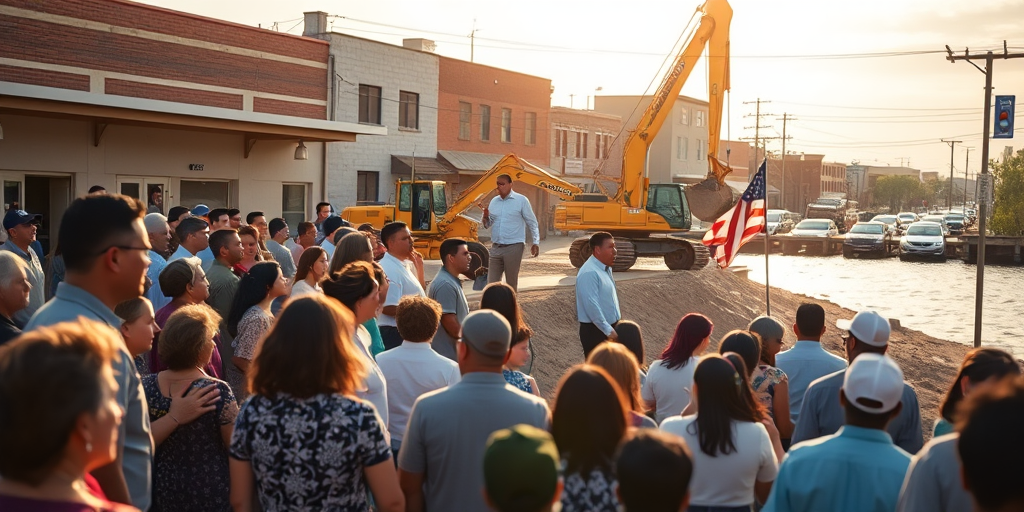McAllen Breaks Ground on Pioneering Groundwater Project
In a significant step toward enhancing water security and sustainability, the city of McAllen has officially embarked on its most ambitious utility initiative to date: a $180 million groundwater project designed to diversify the municipal water supply. This groundbreaking effort marks a pivotal moment not only for McAllen but for the entire Rio Grande Valley (RGV), a region heavily reliant on the Rio Grande for its water needs.
Securing a Sustainable Water Future
As of now, McAllen uses approximately 28 million gallons of water per day, sourced predominantly from the Rio Grande. However, with increasing concerns over water scarcity due to climate change and international water sharing agreements with Mexico, city officials have recognized the urgent need to diversify. The new project aims to supplement the city’s supply with an additional eight million gallons daily through the deployment of six new groundwater test wells.
McAllen Utilities Director Mark Vega elaborated on the necessity of this project. “Right now, McAllen, as well as 95% of the Rio Grande Valley, depends on the Rio Grande,” he explained. “With the recent droughts that we’ve encountered and unresolved water debts from Mexico, this project is pivotal for safeguarding our water future and providing resilience against potential shortages.”
Innovation in Water Management
This project introduces innovative solutions to address the brackish nature of the groundwater extracted from the new wells. Reverse osmosis systems, famed for their efficiency in treating saline water, will be deployed to ensure the water meets safety standards and is fit for public consumption. While the project’s cost is steep, with a price tag of approximately $22 million per additional million gallons, the potential for long-term benefits is significant.
The investment echoes successful precedents in the region, notably the North Alamo Water Supply Corporation’s decision to incorporate groundwater 25 years ago. Their experience shows that groundwater currently constitutes around 25% of their total supply. Stephen Sanchez, General Manager of NAWSC, reflects positively on their transition, stating, “Small cities looking to use groundwater can manage costs by situating wells close to treatment facilities, facilitating incremental expansion and operation when needed.”
Regional Impact and Community Benefits
The implications of McAllen’s project extend beyond city lines, demonstrating a proactive approach to water resource management in South Texas. Cities like Raymondville, Mercedes, and Brownsville are likewise exploring similar ventures, signaling a regional shift towards groundwater utilization.
The potential economic benefits of such projects are substantial. As local water resources become more reliable, economic stability and growth are likely to follow. This could attract new businesses and residents, enhancing the Valley’s economic landscape.
Community advocate Rebecca Garcia noted, “This project is more than just about water; it’s about building the future of the RGV. Reliable water sources are essential for development, both for residents and for industries that might consider relocating here.”
Balancing Cost and Community Needs
Despite its promise, the project does have its critics. Some community members have expressed concerns over the considerable costs, which might necessitate adjustments in public utility rates. However, city officials argue that investing in sustainable infrastructure now could offset more significant challenges and expenses in the future.
Dr. Maria Estrada, an environmental scientist at the University of Texas Rio Grande Valley, weighed in on the broader implications. “While the initial investment is significant, the resilience and independence this gives communities from unpredictable external factors, like international water agreements or climate variability, cannot be overstated.”
Looking Ahead: A Model for Innovation
As McAllen leads this venture, it sets a potential model for other communities facing similar challenges. In an era marked by environmental uncertainty, innovative projects in water management exemplify practical solutions to complex issues facing the Valley.
Residents seeking further information or wishing to participate in public discussions about the project can access resources through McAllen city offices and community forums. These initiatives aim to ensure transparency and foster community involvement.
This project’s successful implementation could mark a transformative era for McAllen and the surrounding regions, solidifying the RGV’s commitment to sustainable growth and community interests in the face of evolving challenges. Through efforts like these, Valley residents can look forward to a secure, resourceful future.







